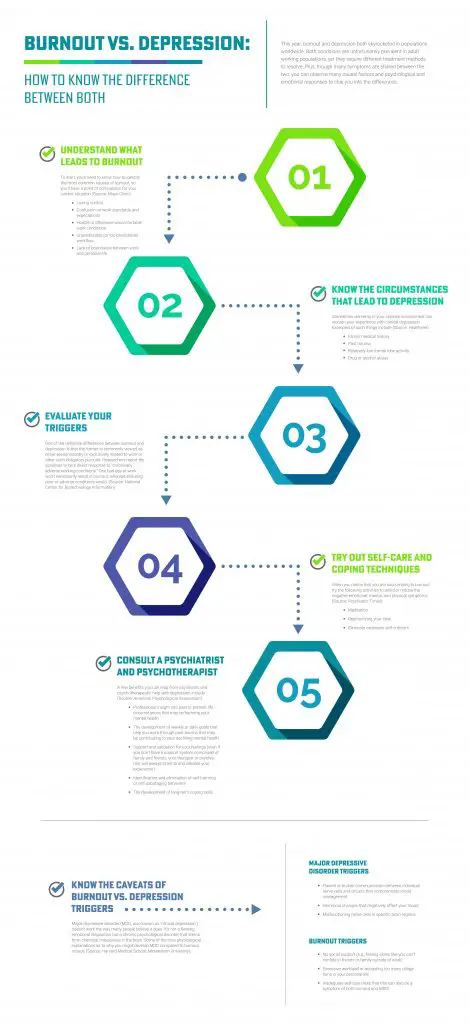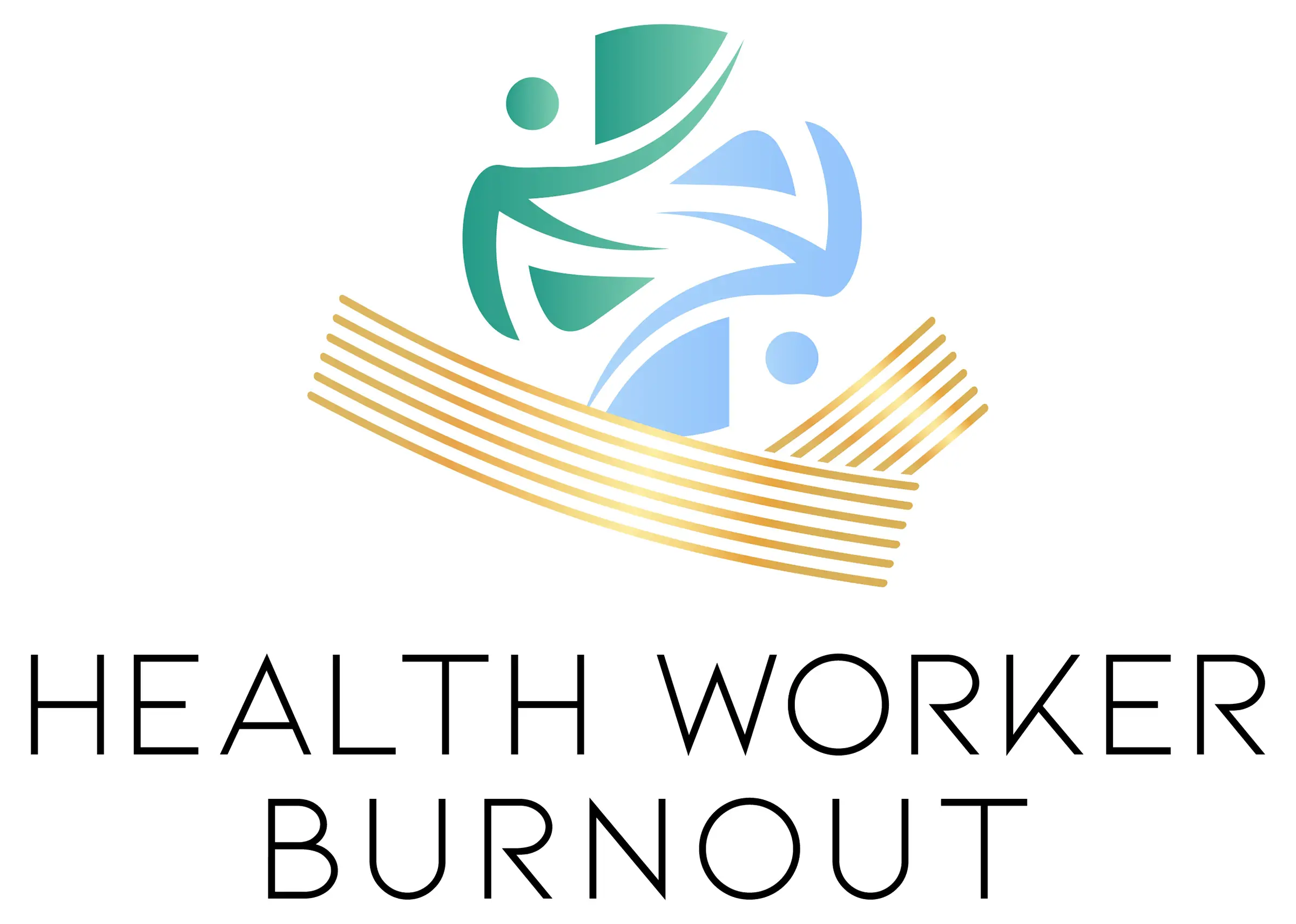This year, burnout and depression both skyrocketed in populations worldwide. Both conditions are unfortunately prevalent in adult working populations, yet they require different treatment methods to resolve. Plus, though many symptoms are shared between the two, you can observe many causal factors and psychological and emotional responses to clue you into the differences.
Still, researchers aren’t too sure where the line is between burnout and depression. The debate goes on as to whether the two are essentially the same, or if one is a temporary disposition, while the other is a chronic illness. The guide below can help you determine whether you are experiencing burnout or depression based on current scientific knowledge and further steps to treat the problem.

Understand What Leads to Burnout
Although depression and burnout are very closely related mental health conditions, the former is far more permanent than the latter. Whereas depression is a chronic medical condition that can manifest either continuously or periodically, burnout is triggered by your external circumstances. Of course, burnout can have lasting effects like depression. However, it does persist in the same intensity.
To start, you’ll need to know how to identify the most common causes of burnout, so you’ll have a point of comparison for your current situation (Source: Mayo Clinic):
- Losing control. Millions of people have suffered through this specific factor this year. When you feel that major aspects of your job are out of your hands (e.g., the hours you work, shift availability, workload, etc.), it’s easy to get worn down by apprehension.
- Note: This might extend to circumstances that directly affect your ability to do your job. Imagine that management fails to provide you with the appropriate tools to work effectively, such as out-of-date software or faulty hardware. You’ll be unusually stressed even while performing basic work duties, as the lack of preparation makes the job harder.
- Confusion on work standards and expectations: This has more of an effect on people than most realize. Suppose you are constantly trying to achieve an unclear professional standard. Whether your efforts are focused on concrete job duties or scope of authority, you’re likely to run out of steam rather quickly.
- Hostile or otherwise uncomfortable work conditions. Negative interactions with co-workers can weigh heavily on anyone, no matter how much they might love their job. Being forced to spend time in the same office or another work environment with people who continually antagonize or alienate you is guaranteed to wear on anyone.
- Unpredictable (or too predictable) workflow. Your job may exist on either side of these extreme ends of the activity spectrum. On the one hand, your career may be so monotonous that your brain feels numb after so long. On the other hand, there could be so much chaos on the job that you’re exhausted from having to adapt to new circumstances continually.
- Lack of boundaries between work and personal life. Do you catch yourself “bringing work home with you?” A poor work-life balance can cause you to feel as if you are working all the time, which will inevitably hurt your mental health in the long-run.
Know the Circumstances that Lead to Depression

One of the most challenging things to grasp about depression is that there are no specific circumstances that can lead you to develop this illness. In many cases, a clinical depression diagnosis can arise because of family genetics. If this is the case for you, there may never be specific situations or events that exclusively cause your condition.
However, sometimes elements in your external environment can worsen your experience with clinical depression. Examples of such things include (Source: Healthline):
- Family medical history: Experts say that individuals with a family history of clinical depression or other such mental health disorders are 2-3 times more likely to develop this illness than others. More specifically, about 20-30% of people whose families have had depression for more than one generation are at risk of being depressed, versus 10% of those without this medical history. (Source: Stanford Medicine)
- If you are suddenly feeling negative about yourself and your life, are physically and emotionally exhausted, but you do not have a history of such feelings or family background of mental health conditions, you may just be experiencing burnout.
- Past trauma: Researchers have repeatedly shown that childhood trauma is a major contributing factor to adulthood depression. In a study observing nearly 350 patients diagnosed with chronic depression, 75.6% of people self-reported childhood trauma. Thirty-seven percent of this group had more than one traumatic experience that led to their present condition. (Source: U.S. National Library of Medicine)
- Relatively low frontal lobe activity: The frontal lobe is a crucial part of the brain that is directly involved in several aspects of daily life. Not only does it play a role in crucial cognitive operations like memory and language, but it helps regulate emotions, social interaction, self-awareness, and even morality. Abnormal frontal lobe activity can throw all these elements out of whack. (Source: National Library of Medicine)
- Drug or alcohol abuse: Substance abuse can significantly increase your susceptibility to mental health disorders like chronic depression. Experts say that approximately 21% of people who abuse drugs and alcohol live with this condition. One study focused in on further detail regarding just how prevalent depression is for substance abusers (Source: U.S. National Library of Medicine):
- The comorbidity rate (two medical conditions occurring simultaneously) for alcohol and clinical depression for men is 24.3%
- The comorbidity rate for women experiencing the same conditions is markedly higher at about 48.5%
- Overall, the chances of co-occurrence between clinical depression and substance abuse in the scientists’ general clinical samples were between 50-70%
Although these factors aren’t causative in and of themselves, they are significant contributors to your chances of receiving a depression diagnosis. Compare these causes to those of burnout and narrow down, which is more likely for you.
Evaluate Your Triggers
One of the definitive differences between burnout and depression is that the former is commonly viewed as either predominantly or exclusively related to work or other such obligatory pursuits. Researchers report the condition to be a direct response to “chronically adverse working conditions.” One bad day at work won’t necessarily result in burnout, whereas enduring poor or adverse conditions would. (Source: National Center for Biotechnology Information)
With this in mind, recall your work environment. Are there harmful job elements you’ve had to endure for an extended period, such as hostility from specific co-workers? Note that the problem will not always be rooted in your staff relationships. The issue may be far simpler than that, perhaps related to the hours you work or having to use sub-par equipment or use unsuitable methods.
Scientists say that the “main component” of burnout is emotional exhaustion. According to health experts, this term refers to the feeling of being so emotionally fatigued by the stress of your personal and/or work life that you lose your sense of agency. You might begin to feel as if you have no control over anything in your life, leading to feelings of being trapped in your current condition. (Source: Healthline)
On the other hand, depression does not often have an exact trigger. In fact, it does not require a trigger at all to manifest psychological symptoms in many cases. In burnout cases, you might be able to identify specific circumstances that led you to feel how you do now. However, those experiencing major depressive disorder are unlikely to have a particular reason since physiology is to blame.
Know the Caveats of Burnout vs. Depression Triggers

Major depressive disorder (MDD, also known as “clinical depression”) doesn’t work the way many people believe it does. It’s not a fleeting emotional disposition but a chronic psychological disorder that stems from chemical imbalances in the brain. Some of the core physiological explanations as to why you might develop MDD compared to burnout include (Source: Harvard Medical School; Midwestern University):
Major Depressive Disorder Triggers | Burnout Triggers (in addition to causes above) |
|
|
Identifying triggers can be tricky because MDD can also occur in episodes. So, although these mechanisms may be at the core of why your condition emerged, they may not be working alone. For example, post-partum depression is a type of single (yet long) MDD episode triggered by giving birth. However, someone who inherited the condition will not so easily identify any contributing factors.
With all this in mind, make sure to consider all the current stressors in your life. While there may be things that look like a specific trigger, understand that they may not be the sole culprit behind your psychological condition. Instead, there may be a chronic, underlying mental health problem. However, if you’ve been living with clear, long-lasting professional or self-imposed pressures, it’s likely burnout.
Monitor How Long You’ve Been Feeling This Way
Differentiating between MDD and burnout based on time is quite challenging, as there are no distinct periods on which you can build a bona fide MDD diagnosis or identify burnout. However, instead of trying to mark a definitive timeline for your poor emotional and mental stability, compare these two possible conditions in terms of general longevity.
For example, ask yourself: Have I experienced these feelings of helplessness, fatigue, unbearable sadness, difficulty concentrating, etc. before? If the answer is yes, and you can recall numerous episodes characterised by these feelings throughout your life, you may have a history of clinical depression.
If this is the first time, you cannot definitively rule out depression, but you do have more reason to believe that this may be stemming from work-related stress. You must also realize that just because burnout can be easier to treat does not mean it will be. MDD can take several years to learn how to manage, and burnout can take just as long to recover from. It all depends on the individual.
Try Out Self-Care and Coping Techniques

You are very likely to respond to self-care and coping techniques much differently if your condition is burnout instead of MDD. Now, this is not to say that self-care can work on one versus the other. Rather, this means that it is much harder to treat a clinical mental health disorder such as MDD with rest and self-pampering than to alleviate burnout symptoms.
For example, when you notice that you are succumbing to burnout, try the following activities to avoid or reduce the negative emotional, mental, and physical symptoms (Source: Psychiatric Times):
- Meditation: According to recent research, this practice has great promise for alleviating burnout symptoms. A 2017 study demonstrated significant improvements in participants’ mental health, especially in reducing emotional exhaustion, rates of depersonalisation*, and increased recognition of personal accomplishments. (Source: U.S. National Library of Medicine)
- *Depersonalisation can start as a feeling colloquially known as “standoffishness.” However, it can develop into a clinical disorder, wherein you live with compromised self-awareness and may extensively dissociate from your surroundings. Such dissociation may extend to other people, yourself, or the physical environment. (Source: Psychology Today)
- Reprioritising your time: It’s so tempting to aim for just a “little bit more” when you either love or are excelling at your job (or both!). Before you realize it, you might find yourself responding to emails on your day off or attending a meeting on the weekend. Practice saying “no” to such obligations and prioritise your rest time. This will help relieve you of burnout-related stress.
- Eliminate excessive self-criticism: Don’t add to the stress of burnout by talking down to yourself or piling on undeserved guilt or unhelpful critique. Remember that you are human, and you deserve the room to make mistakes now and then. Don’t be too hard on yourself if your productivity has wavered at work. Take a break before you get back it.
- As you work to reduce the frequency with which you engage in negative self-talk, incorporate more positive self-affirmations into your daily routine. Studies show that such affirmations can boost problem-solving, ultimately improving your work performance and reducing causative burnout. (Source: PLOS One)
How can you tell the difference between burnout and depression by trying coping techniques? By monitoring your response to these methods. While burnout may either significantly weaken or go away entirely, depression is likely to stick around, as it is a chronic health condition. In this case, you’re not doing anything wrong. You may simply need professional assistance and medication to make progress.
Consult a Psychiatrist and Psychotherapist
As previously stated, treating depression is not as simple or straightforward as addressing problems related to burnout. For the latter, it’s relatively easy to find solutions on your own. Yet, depression calls for complex treatment that may last for months or even years, in some cases.
Further, if your MDD does stem from childhood trauma or abnormalities in your brain’s function or nerve structure, you are not equipped to issue an accurate diagnosis on your own. Treatment methods and coping practices must be based on a thorough psychiatric evaluation of your past and present mental and emotional health.
The activities listed above can offer temporary relief for your experience with MDD. Still, the sadness, lethargy, cognitive challenges, and other permanent or chronic symptoms related to this illness will surely resurface without a trained professional leading you through the healing process. A few benefits you can reap from psychiatric and psychotherapeutic help with depression include (Source: American Psychological Association):
- Professional insight into past or present life circumstances that may be harming your mental health
- The development of weekly or daily goals that help you work through past trauma that may be contributing to your declining mental health
- Support and validation for your feelings (even if you don’t have a support system comprised of family and friends, your therapist or psychiatrist will always listen to and validate your experience)
- Identification and elimination of self-harming or self-sabotaging behaviours
- The development of long-term coping skills
Accept That the Two Aren’t Entirely Separate

Finally, the hardest step: Understanding and accepting that burnout and depression are not entirely distinct psychological conditions. Thus far, you’ve seen how to distinguish one from the other based on causal factors, your response to treatment and coping techniques, and the potential need for professional help. Now, it’s time to look at the overlap between the two.
Remember that burnout is a mental or emotional condition caused by your external environment. Most of the time, this “environment” is the workplace. It often leads to sadness, self-isolation, and many more symptoms like those that characterize depression. Of course, with proper treatment, these can go away. Yet, when left unchecked, they can develop into a more severe problem.
For example, suppose you remain in the same job that makes you unhappy, or you fail to address the office’s toxic relationships and dynamics. In that case, early burnout can snowball into a depressive episode. This can have lasting consequences on your life and wellbeing, so it’s important to recognize burnout symptoms as soon as possible.
It’s crucial to recognise that, although many things distinguish burnout and depression, they are not entirely unrelated. Scientists aren’t even sure about the extent to which they overlap and have found significant evidence for strong associations between these conditions and anxiety. Forcing explanations for the separation of the two conditions may lead you to avoid necessary treatment. (Source: Frontiers in Psychology)
In Conclusion
It’s challenging to identify the differences between burnout and depression, especially since scientists aren’t quite sure whether there’s a true distinction between the two or just how much they overlap. To identify the differences between burnout and depression for yourself, you’ll need to:
- Understand what leads to burnout
- Know the circumstances that lead to depression
- Evaluate your triggers
- Know the caveats of burnout vs. depression triggers
- Monitor how long you’ve been feeling this way
- Try out self-care and coping techniques
- Consult a psychiatrist and psychotherapist
- Accept that the two aren’t entirely separate
Be thorough and truthful with yourself when working your way through this guide, and you’ll be well-equipped to get yourself the proper treatment.
Content Disclaimer
The information contained above is provided for information purposes only. The contents of this article are not intended to amount to advice and you should not rely on any of the contents of this article. Professional advice should be obtained before taking or refraining from taking any action as a result of the contents of this article. HealthWorkerBurnout.com disclaims all liability and responsibility arising from any reliance placed on any of the contents of this article.
Copyright Notice
These works are protected by copyright laws and treaties around the world. We grant to you a worldwide, non-exclusive, royalty-free, revocable licence to view these works, to copy and store these works and to print pages of these works for your own personal and non-commercial use. You may not reproduce in any format any part of the works without our prior written consent.
Copyright © 2022 HealthWorkerBurnout.com


5 comments